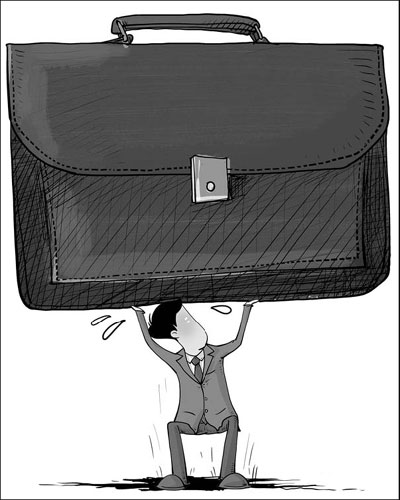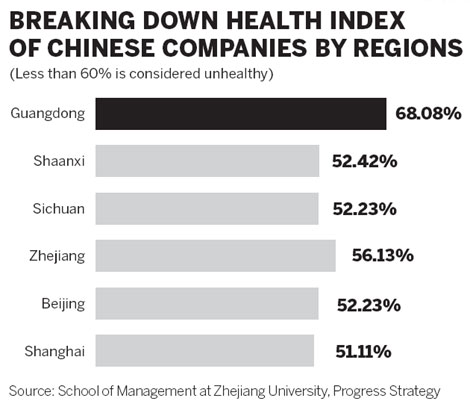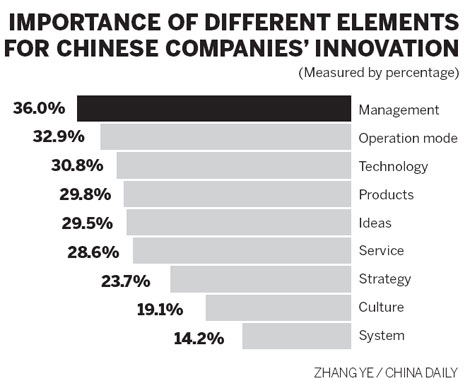Emphasis 'too much on profits'



Chinese businesses 'fail health test': New report
As China undergoes its transition from a planned to a market economy, Chinese entrepreneurs still have lessons to learn about good corporate citizenship, observers say.
Recent exposures of food safety scandals such as melamine in milk, chemicals that promote faster growth in pigs and toxic capsule coatings horrified the public because of the way they showed an absence of social responsibility and business ethics among some Chinese entrepreneurs.
"Over the past three decades, China has seen fast economic development in which Chinese entrepreneurs and enterprises played an important role but in doing so they also faced challenges," said Wu Xiaobo, dean of the School of Management at Zhejiang University. "It should be noted that such high-speed development of the economy is often at the cost of heavy consumption of resources and degradation of the environment. We must confront this problem."
A recently published report showed that many Chinese entrepreneurs have an anemic performance in terms of corporate behavior and less positive attitudes toward the current business environment, despite their widely recognized and frequently applauded pioneering spirits.
The report, China's first 'health index' for Chinese enterprises, was conducted by the School of Management at Zhejiang University and the Beijing-based Progress Strategy consulting company.
It was designed to discover the condition of Chinese enterprise and to explore how to improve its ability to achieve sustainable development. Researchers polled 328 Chinese entrepreneurs from the country's 15 provinces and municipalities through a questionnaire and in-depth interview. Most of those quizzed are at deputy chief level or above and had decision-making power.
The result showed that Chinese enterprises are not in a healthy condition, earning a total score of 56.05 percent, a figure most would consider to be a failure. It also found they have become so focused on maximizing profits and expanding fast that they neglect other elements that are crucial for business growth.
The businesses were evaluated from three angles: entrepreneurial spirit, business practice and business environment. They scored 61.01, 56.27 and 50.47 respectively.
Furthermore, in business practice, Chinese enterprises only scored 49.38 when it came to legal compliance. This section mainly includes business ethics and keeping to the spirit of a contract.
"Business ethics and the spirit of contract are the foundations of the market economy. However, a string of food safety scandals across the country has dominated headlines in recent years. It requires a review and self-examination by Chinese enterprises. The cost caused by lower legal compliance is very high for an enterprise," Wu said, adding that poor performance in legal compliance reflected the fact that Chinese entrepreneurs need to improve their sense of responsibility toward their employees, their customers and society as a whole.
"Today, we see many enterprises expand their businesses and become bigger and bigger. But this does not imply they are in a healthy condition," said Zhou Chengjian, the president of the Shanghai-based textile company Metersbonwe Group.
"To constantly adjust itself according to the changing environment is quite important for an enterprise's healthy development. Today's China is filled with opportunities. Facing so many potential seductions, entrepreneurs should know clearly know what he or she should do. A successful enterprise's establishment and growth needs time and patience and also hardship," Zhou said.
Li Xinchun, former dean of the business school at Sun Yat-sen University, said business schools play an important role in educating entrepreneurs.
"Many entrepreneurs globally are entering business school for further education. Here, entrepreneurs should be educated about what they should do, what is worthy of doing. Sometimes, a course of action may not lead to a quick profit but it will bring healthy development in the longer term," Li said.
Mahendra R. Gupta, dean of the Olin Business School at Washington University in St Louis, believes many factors should be included in the assessment of a company's success, not just profit.
"A successful company should also take its social responsibility seriously while making a profit. Managers should learn to help people, communities and society while gaining management knowledge," he said.
The Olin Business School has carried out an executive MBA program with Chinese business schools for years that focuses on the cultivation of a global perspective in the business education of managers.
"This is a course for mutual study. Chinese managers can learn from the experiences of US companies while managers from other countries will also have a better understanding of China," he told China Daily during a recent trip to Shanghai.
Dave Schoch, chief executive officer of Ford Motor China, believes that a company should not only manufacture great products but also provide value to society in a way that builds a strong business and better society.
"We have tied our company's economic health to the environmental health of our planet and to the broader social health of the communities in which we operate. In other words, sustainability targets fundamentally affect the way we run our business," Schoch said.
He said sustainability is one of the core values and is at the heart of business. It is important to have a full understanding of such a core value. As early as in 2000, Ford initiated its Conservation and Environmental Grants, China program, which to date has supported 278 trailblazing environmental organizations and individuals.
Yuan Yue, chairman of Horizon Consulting Group, the parent company of Progress Strategy, sees the connection between personal moral requirements and enterprises as relevant.
"Many people like to talk about the outer environment, government policy and over-strong government interference. But it's more of an excuse as enterprises' development depends on individual behavior. For a healthy enterprise, I think, the entrepreneur should know his boundary for responsibility when conducting business."
wanghongyi@chinadaily.com.cn
(China Daily 06/05/2012 page14)














